Specific content
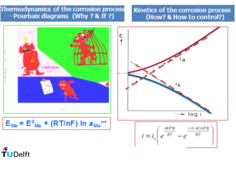
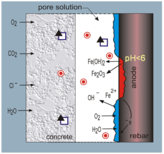
Theory
Part I: Corrosion & corrosion costs: relevance to materials’ & infrastructure durability, economy & society, corrosion impact ► Corrosion types – classification and overview ► Chemical corrosion – oxide layers, growth, protective ability.
Part II: Corrosion mechanisms (general, localized, galvanic corrosion) ► General and localized corrosion, forms and environment ► General corrosion vs localized corrosion ► Galvanic corrosion ► Microbiologically-induced steel corrosion.
Part III Electrochemical corrosion – electrochemical terminology - Electrochemical & electrolytic cells ► Electrochemical thermodynamics and kinetics ►Passivity and stability of passive films
Part IV: Protection against corrosion - Galvanic coatings and layers - Hot-dip Zn coatings – Electrodeposition - Organic coatings and liners (overview) ► Cathodic protection (impressed current and sacrificial)
Part V: Corrosion and protection in reinforced concrete ►Cement-based microstructure and micromechanics related to steel corrosion and steel/cement paste interfaces ►Corrosion and impressed current cathodic protection evaluation: synergy of electrochemical methods and cement-based material science (microstructure of cement-based materials)
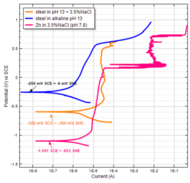
Hands-on practical sessions
- electrochemical methods for corrosion assessment (lab) – metals in aggressive medium: electrochemical response & corrosion current densities (corrosion rates);
- new: evaluation of corrosion products on metals prior to & after corrosion tests – qualification via electron microscopy (ESEM) and surface analysis (EDS) ;
- corrosion tests in reinforced concrete – corrosion state of steel reinforcement in reinforced mortar & concrete; new: electron microscopy steel/cement interface;
- corrosion protection (lab and field) – demonstration of impressed current cathodic protection - application & efficiency evaluation;
- synergy of electrochemistry and concrete material science – correlation of results on corrosion rates of steel and microscopy of steel/cement paste interface; cement-based bulk matrix electrical properties – links with electrochemical techniques (EIS).
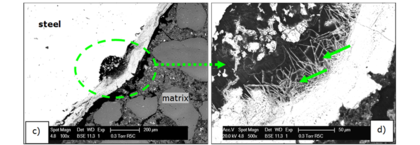
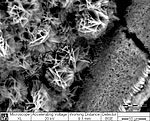
Interactive & workshop sessions
- demonstration & use (electrochemical) equipment;
- tailor-made, interactive modules, (optional) Q&A modules;
- case studies discussion – participants and tutors;